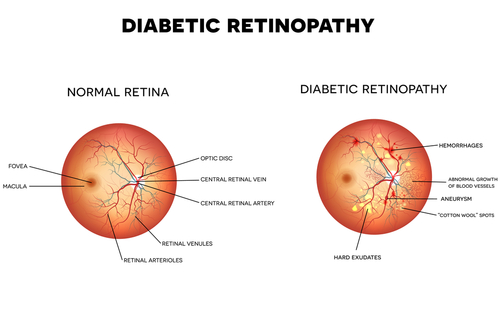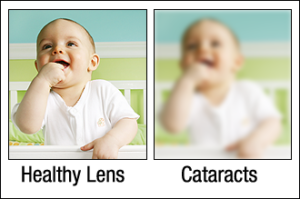Can I Have Diabetic Retinopathy and Cataracts?in Boston, MA

As you get older, your risk of developing age-related eye conditions increases. But certain risk factors put you at higher risk for specific eye conditions.
One of these factors is having diabetes. Diabetes can affect many aspects of your health, including your eyes and how healthy they are.
By having diabetes, you increase your risk of cataracts forming. Cataracts are a prevalent eye condition that almost everyone will develop due to aging. But if you have diabetes, cataracts may start at a much younger age.
You can only be diagnosed with diabetic retinopathy if you have diabetes. Because having diabetes puts you at risk for both these conditions, you can have both simultaneously. Keep reading to learn more about these conditions!
Diabetic Retinopathy
Diabetic retinopathy is a disease that affects your retina. The retina is the thin membrane in the back of your eye.

When light passes through your eye, it hits the retina, and then the special cells that make up the retina, called photoreceptors, translate that light into impulses sent to your brain. The impulses can then be processed as images you can understand and see.
When you have high blood sugar, the blood vessels in your retina may become cut off. If this occurs, it causes the ends of the blood vessels to swell and leak.
It also generates new blood vessels which form abnormally. The swelling, leaking, and build-up of abnormal blood vessels can damage the retina, killing the photoreceptor cells. This, in turn, can affect your vision, causing blind spots that correspond to the damage on the retina.
The damage that’s done to the retina due to diabetic retinopathy is irreversible. It’s vital for anyone with diabetes to manage blood sugar levels and have regular eye exams with their eye doctor.
Diabetic retinopathy shows no symptoms before vision loss. It’s crucial to receive a diagnosis early on to avoid vision loss and preserve your remaining vision by receiving regular eye exams.
Although you cannot cure diabetic retinopathy, you can slow it down when it’s diagnosed in the early stages, preventing any further damage to the retina.
Cataracts

Cataracts are an eye condition that almost everyone will have as they get older. About half of all adults will have at least one cataract by the time they turn 75.
They occur when the natural lens becomes cloudy, making it harder to see through. The development of cataracts can take years or even decades.
You may not even realize you have cataracts at first since symptoms may be undetectable until your vision worsens. Symptoms include blurry vision, poor night vision, glare, halos, light sensitivity, and trouble distinguishing contrast.
Having diabetes does increase your risk for cataracts, although it’s not the only thing that does. Cataracts can eventually get bad enough to cause blindness, but the good news is that any vision loss from them is fully treatable by undergoing cataract surgery.
It’s still necessary to have regular eye exams to diagnose cataracts as soon as possible, especially if you’re at higher risk due to diabetes or other factors.
Risk Factors
There are a few things that make it more likely that you’ll develop cataracts. These factors include:
- Diabetes
- High blood pressure
- Being over 40
- Overexposure to sunlight
- Obesity
There are also a few factors that increase your risk of diabetic retinopathy, which include:
- Poorly managed diabetes
- Having diabetes for a long time
- Being over 60
- Having high blood pressure

It’s not uncommon for risk factors for diabetic retinopathy and cataracts to overlap. If you have several risk factors and diabetes, you’re more likely to have diabetic retinopathy, cataracts, or both.
There are treatments available for both conditions, but treating them at the same time can be complex.
Treatment
Diabetic retinopathy does not have a cure, but it can be treated to slow down the potential for further vision loss. Treatment options can include several different things.
There are some medications that you can have injected into the eye. These medications help to prohibit the production of a protein that stimulates new blood vessel growth. Steroid injections can also help prevent further damage to the retina.
There are also surgical procedures for diabetic retinopathy, like laser photocoagulation. Laser photocoagulation uses a laser to seal off leaking blood vessels and prevent further leakage. If you have diabetic retinopathy, your eye doctor may suggest different treatments depending on the severity of the disease.
The only way to treat cataracts is to have them removed during cataract surgery. However, if you also have diabetic retinopathy, it can be challenging to get cataract surgery.
Cataract surgery may even make diabetic retinopathy worse. If you already have severe diabetic retinopathy, cataract surgery may not be advisable.
The best thing for diabetic patients is to have their cataracts treated as soon as possible before they develop diabetic retinopathy. Usually, cataract surgeons only recommend having surgery once your cataracts affect your quality of life.

But if you have diabetes, you’re at a high risk of developing diabetic retinopathy. When you develop diabetic retinopathy, getting cataract surgery becomes more dangerous. If possible, you should have your cataracts removed right away.
For some patients, this isn’t always possible. There are still ways to manage your conditions. Cataract surgery isn’t impossible if you have diabetic retinopathy; it’s just a higher-risk procedure.
Your eye doctor will be able to inform you of the risks and your options if you have diabetic retinopathy and cataracts. To prevent the development of early diabetic retinopathy, you can manage your blood sugar levels, eat healthily, and stay active.
See your eye doctor regularly so they can spot the early signs of cataracts or diabetic retinopathy. As long as you stay on top of your health, you should be able to manage either condition should they arise safely.
Do you have questions or concerns about diabetic retinopathy or cataracts? Request an appointment at the Nielsen Eye Center in Boston, MA!
Our Patient Advocates are patiently sitting by the phone waiting to answer your questions about these eye conditions, so contact us at 617-471-5665 now!



